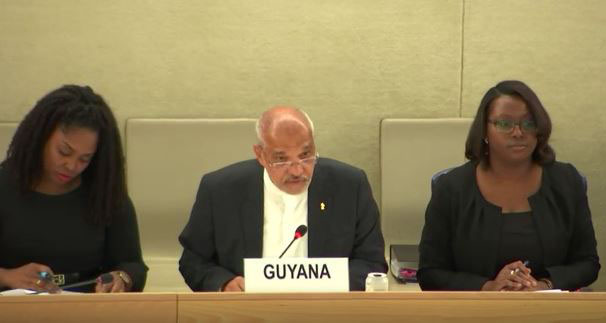The United States yesterday called upon Guyana to ensure that the March 2nd general elections are free and fair and expressed concerns about the Government’s “apparent misapplication” of the country’s constitution and “certain court rulings.”
US Ambassador Sean Mariano speaking at the 35th Session of the United Nations’ Universal Periodic Review in Geneva, Switzerland recommended that Guyana immediately implement reforms to strengthen electoral procedures to enhance the independence of electoral authorities in order to ensure the March 2nd elections are “free, fair, transparent and credible.”
“The United States in concerned by recent actions by Guyana that may undermine democratic principles, including apparent misapplication of the Guyanese constitution and certain court rulings,” the representative said.
Mariano would likely have been referring to the fact that the Government did not dissolve Parliament and call elections within three months of the December 21st 2018 No Confi-dence Motion passed in the National Assembly but instead proceeded to challenge it in the courts which moved all the way to the Caribbean Court of Justice (CCJ). The CCJ was asked to rule on various cases emanating from the motion and ruled that the motion was validly passed and that the relevant sections of the constitution were now applicable. It however issued no coercive orders and the Government did not call elections until several months after those rulings.
The unconstitutionality of the appointment of former Chairman of GECOM, Justice James Patterson would also be another area where President David Granger ran afoul of the constitution.
Yesterday’s statement in Geneva was further evidence of the close attention Washington is paying to ensuring free and fair elections here.
On September 19 last year, the US subscribed to a joint statement with the UK and the European Union which accused the APNU+AFC government of breaching the constitution.
The joint statement read in part:
“The United States, United Kingdom and the European Union thank the Guyana Elections Commission (GECOM) for devising a proposed elections timeframe for conducting General and Regional Elections.
“However, we deeply regret that, by surpassing September 18, the Government is currently in breach of the Constitution following its failure to adhere to the decisions of the Caribbean Court of Justice (CCJ) on 18 June and its subsequent orders.
“This situation comes at great cost to the people of Guyana. The prevailing political uncertainty undermines Guyanese institutions, compromises economic opportunities and delays development across all areas including infrastructure, education, health, and social services. It also hinders our ability to support Guyana’s development needs.
“We therefore call upon the President to set an elections date immediately in full compliance with Guyana’s constitution.”
Yesterday, Germany and the Indian Ocean island chain, the Maldives also spoke to the country having free and fair elections.
Lena Handwerk of Germany expressed the expectation that the elections will be free, fair, transparent and peaceful so that the electors of Guyana can exercise their legitimate right to vote under safe and secure conditions. Hala Hameed of the Maldives called for the strengthening of the electoral process by implementing the electoral laws to register all political parties, ensuring credible and transparent elections in line with international standards.
Guyana’s Permanent Representative to the UN Dr. Ronald Deep Ford, who led the country’s delegation of four to the review, in response pointed out that the Guyana Elections Commission (GECOM) is a constitutional body and is independent from the state and committed to delivering as indicated “free, fair, transparent and credible elections on March the 2nd 2020.”
The country’s report with all recommendations will be prepared by Australia, Chile and Pakistan and will be circulated by February 7th.
Over sixty representatives addressed Guyana during the two-hour review in Geneva and the majority spoke on abolishing the death penalty and decriminalising same sex relations.





